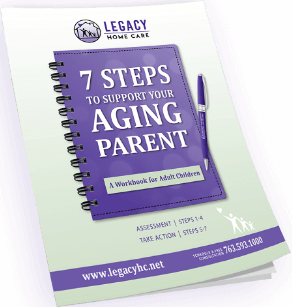Physical Health Changes That Signal the Need for Professional Care
When your parent’s physical health begins to decline, certain warning signs indicate that professional intervention may be necessary. These changes often happen gradually, making them easy to overlook until they become more serious.
Mobility and Fall Risk Concerns
If your parent has experienced falls or near-falls, professional help may be necessary. According to the CDC, falls are the leading cause of injury among seniors, and a single fall can dramatically impact their independence and confidence.
Medication Management Issues
Complex medication schedules become increasingly challenging as people age. If you notice missed doses, double-dosing, or confusion about prescriptions, these issues require immediate attention.
Luckily, in-home caregiving services in Minneapolis, MN, often include trained professionals who can safely manage medication routines and coordinate with healthcare providers.
Personal Care Difficulties
When basic activities like bathing, dressing, or grooming become challenging for your parent, it’s time to consider professional support. These intimate care needs require specialized skills and equipment that trained caregivers can provide while maintaining your parent’s dignity and safety.
Cognitive and Mental Health Warning Signs
Changes in cognitive function and mental health can be subtle at first. However, once you spot the signs, they signal the need for professional assessment and ongoing support.
Memory and Decision-Making Challenges
If your parent frequently forgets important information, struggles with familiar tasks, or makes uncharacteristic decisions, these changes warrant professional evaluation. Early intervention can help maintain their independence longer while ensuring their safety.
Social Isolation and Depression
Seniors who withdraw from social activities, show signs of depression, or express feelings of loneliness may benefit from professional companionship and mental health support. Home health aide in Minneapolis, MN, services often include social interaction and emotional support as part of their comprehensive care approach.
Confusion About Time, Place, or People
Delirium or disorientation about dates, locations, or familiar people indicates cognitive changes that require professional attention. These symptoms can affect your parent’s ability to live safely alone and may signal the need for more structured care.
Safety and Environmental Concerns
Your parent’s home environment and their ability to maintain safety independently are crucial factors in determining when professional help becomes necessary.
Household Management Struggles
When routine household tasks become overwhelming or dangerous, it’s time to consider professional support. Signs include:
- Spoiled food in the refrigerator or empty pantry
- Unpaid bills or financial disorganization
- Poor home hygiene or maintenance
- Difficulty with appliances or technology
Emergency Preparedness
If your parent cannot respond appropriately to emergencies or doesn’t have reliable communication systems in place, professional care can provide essential safety monitoring and emergency response capabilities.
Driving and Transportation Issues
Loss of driving ability often signals declining physical or cognitive function. Private pay home care in Minneapolis, MN, services can provide transportation support, ensuring your parent maintains access to medical appointments, social activities, and daily necessities.
Family Caregiver Burnout and Limitations
Recognizing your own limitations as a family caregiver is just as important as identifying your parent’s changing needs.
Physical and Emotional Exhaustion
Caregiving is physically and emotionally demanding. If you’re experiencing chronic fatigue, health problems, or emotional overwhelm, seeking professional help protects both you and your parent. Quality care requires healthy caregivers.
Work and Family Balance Challenges
When caregiving responsibilities interfere with your job performance or family relationships, professional support can help restore balance. Many adult children find that in-home caregiving services in Minneapolis, MN, allow them to maintain their careers while ensuring their parent receives appropriate care.
Lack of Specialized Skills
Some health conditions require specialized knowledge and training. If your parent needs complex medical care, physical therapy, or specialized equipment management, professional caregivers have the expertise to provide safe, effective support.
Making Your Decision: Types of Professional Help Available
Understanding your options helps you make informed decisions about the level of care your parent needs.
Companion Care Services
For parents who need social interaction and light assistance with daily activities, companion care provides valuable support without intensive medical intervention.
Personal Care Assistance
When help with bathing, dressing, and mobility becomes necessary, personal care assistants can maintain your parent’s dignity while ensuring their safety and comfort.
Skilled Nursing Care
For complex medical needs, skilled nursing professionals can provide medication management, wound care, and coordination with healthcare providers, all in the comfort of your parent’s home.
When Asking for Help Is an Act of Love?
Recognizing when to seek professional help for your elderly parent is a sign of wisdom and love, not failure. So, trust your instincts, seek guidance from healthcare professionals, and remember that asking for help is a courageous step toward providing the best possible care for your loved one.
We’re here to support you and your elderly parents with quality and personalized in-home caregiving services in Minneapolis, MN. Reach out today and let us provide the personalized home care your elderly parent deserves.




How To Get Home Health Care for Elderly Loved Ones: A Step-by-Step Guide
Step 1: Check What Care Your Loved One Needs Start…